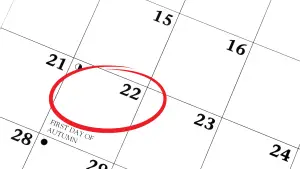When there are big events coming up, you may hear someone say a phrase like “I hope you marked your calendar”, or “save the date”. What do these expressions mean, and how do you use them?
“Marked your calendar” is an expression referring to marking your calendar to save a date. People will say this to you in the hopes that you marked an event down on your calendar, therefore ensuring you will come to that event. There are many variations of this phrase, but the two most common are “save the date” and “I hope you marked your calendar”.

What “Marked Your Calendar” Means
Luckily, this phrase is very easy to break down since it only includes three words: marked, your, and calendar. Marked means a variety of things, but in this context, it means to physically mark something whether it be with a pen, marker, pencil, etc.
Your and calendar go together since they mean the calendar in your possession. When you combine these words, “marked your calendar” means to mark your calendar with an event, meeting, wedding, etc.
People say this expression to refer to marking your calendar for certain dates. These dates tend to be weddings, work meetings, baby showers, and other massive events that will need several weeks if not months of planning.
This expression can also be used in more casual settings. For example, if you make plans to go out with your friend, you can tell your friend to “mark their calendar”, that way they won’t forget about your plans.
How To Use “Marked Your Calendar”
There are a few different expressions that mean the same thing as “marked your calendar”. One of these that was mentioned before is “save the date”. You’ll see this expression on wedding invitations especially, and this expression means to save the date and not forget it.
To use “marked your calendar”, you should add “I hope” or “did you” in front of it to make “I hope you marked your calendar” or “did you mark your calendar”.
Here are a few examples of “marked your calendar” used in a sentence:
“Cassie’s wedding is coming up, I hope you marked your calendar.”
“Our annual meeting with the CEO is coming up. Did you mark your calendar?”
